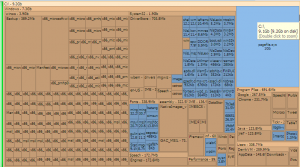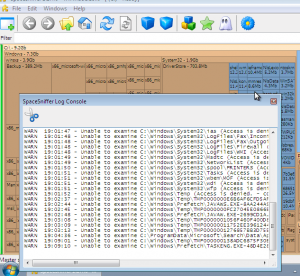 Sometimes you need to know exactly what is taking up space on your hard drive. SpaceSniffer makes it very easy to catalog all of the folders and files on your machine and exactly how big each directory/file is. It’s a wonderful tool for people that are trying to organize all their data.
Sometimes you need to know exactly what is taking up space on your hard drive. SpaceSniffer makes it very easy to catalog all of the folders and files on your machine and exactly how big each directory/file is. It’s a wonderful tool for people that are trying to organize all their data.
WHAT IS IT AND WHAT DOES IT DO
Main Functionality
SpaceSniffer is an application that scans your hard drives to catalog how space is used up. It helps you identify large files/folders, similar to what Disk Space Fan does.
Pros
- Very easy to understand
- The export module function allows you produce customized textual reports
- Intuitive program layout with multiple views for various medias
- Modules are able to be zoomed in upon
- Windows folder menu is readily accessible
- Simple controls that are similar to web browsers
- Supports the tagging and color coding of modules
- Supports scanning of NTFS data streams
- Does not use registry configuration (instead uses XML)
- Allows you to use custom shapes for modules
- Keeps file system in sync and warns you of changes
- Is portable
- Cache’s scans for later use
- Drag and drop
- Robust filtering feature, allowing you to filter your search by file types
- While a scan is running you can view modules
Cons
- Scans sometimes take a long time
- Command execution prompt somewhat irritating
- Not very much eye candy. In fact, interface is a bit bland.
Discussion
 I can never get enough useful utilities for Windows. SpaceSniffer is no exception. It’s a wonderful tool that has quickly helped me keep my files orderly, and has helped me grok the memory footprint of all the directories on my hard drives. SpaceSniffer has a lot of wonderful features and I am thoroughly impressed with it.
I can never get enough useful utilities for Windows. SpaceSniffer is no exception. It’s a wonderful tool that has quickly helped me keep my files orderly, and has helped me grok the memory footprint of all the directories on my hard drives. SpaceSniffer has a lot of wonderful features and I am thoroughly impressed with it.
I’m very impressed with the fact that SpaceSniffer doesn’t use the Windows registry for configuration. It uses XML, and that makes the program portable. It’s nice to have something like this on a usb stick or drive. SpaceSniffer can create a cache of a scan so that when you scan at a later time, as well as keeping your file system in sync. It can also warn you of changes that are made. All very valuable features.
I absolutely love the filtering feature that is implemented in SpaceSniffer, it’s very powerful and has tons of compelling features, and when it comes down to it, can be very useful. It’s the ideal program for a scenario where you’re trying to organize your file system and you want to know exactly what is taking up which part of the file system. I have a very hard time criticizing SpaceSniffer.
The few criticisms that I do have would be as follows. The command processing window (the one that tells you which files cannot be scanned or other things of that nature) pops up and is a bit annoying. The scanning also can take a long time depending on how big your drives are or how many files you have. The scanning speed is to be expected so it’s not that big of a deal breaker in my book.
SpaceSniffer is a very useful program, one that I plan on using in the near future. I’m positive that there are satisfactory alternatives, but as far as I’m concerned SpaceSniffer has all the bases covered. I’ll gladly extract this to my portable USB stick to add it as part of my Windows repair kit. You never know when something like this will come in handy.
CONCLUSION AND DOWNLOAD LINK
If you’re interested in figuring out exactly what files and folders resides on your system, and how big they are, you owe yourself to install SpaceSniffer. It’s a wonderful program, one that I find very intuitive and full-featured. You’d be doing yourself a disservice if you pass this one over. So go on and try it out. You never know, SpaceSniffer could quickly become your go-to hard drive storage space scanning tool.
Price: Free
Version reviewed: 1.1.3.1
Supported OS: Windows XP, Windows Vista, Windows 7
Download size: 1.45MB
VirusTotal malware scan results: 0/37
Is it portable? Yes

 Email article
Email article



